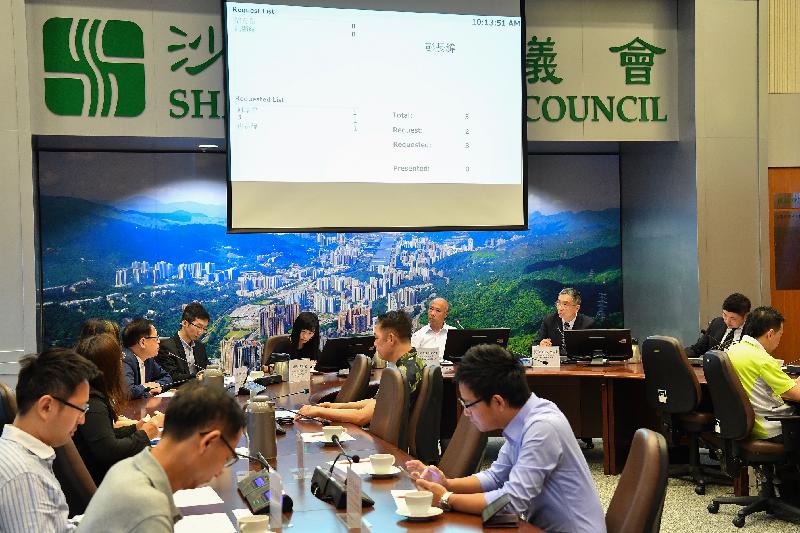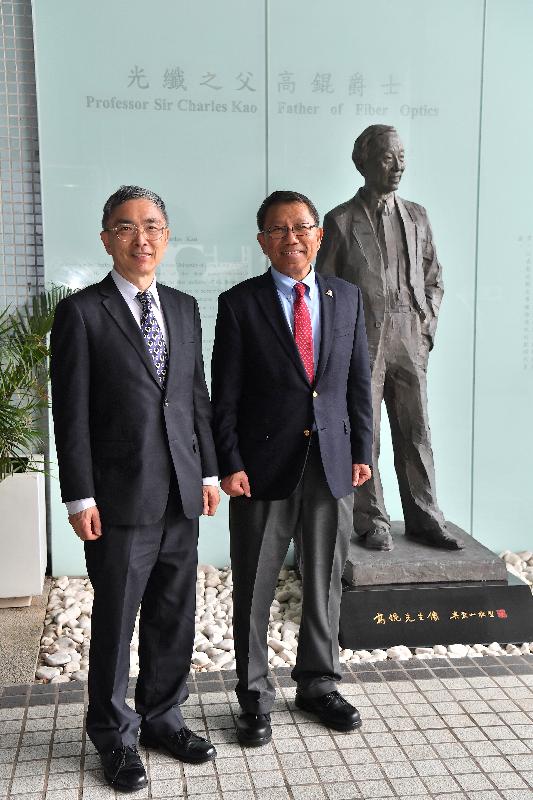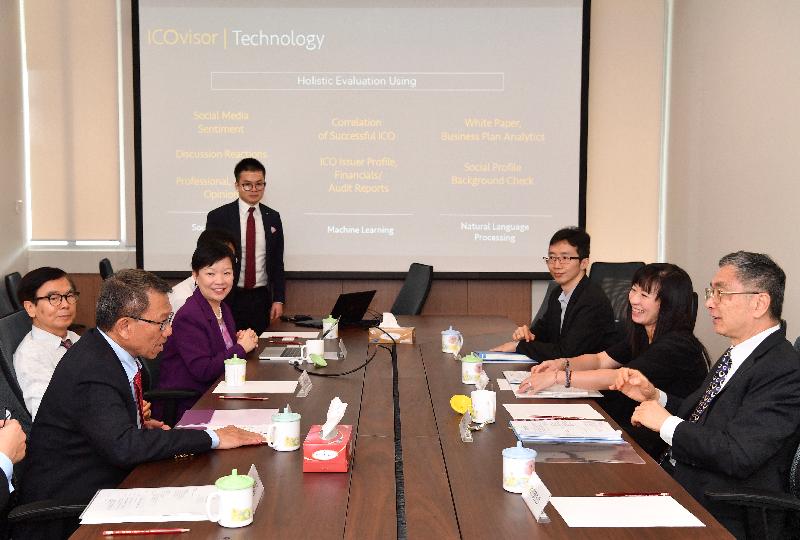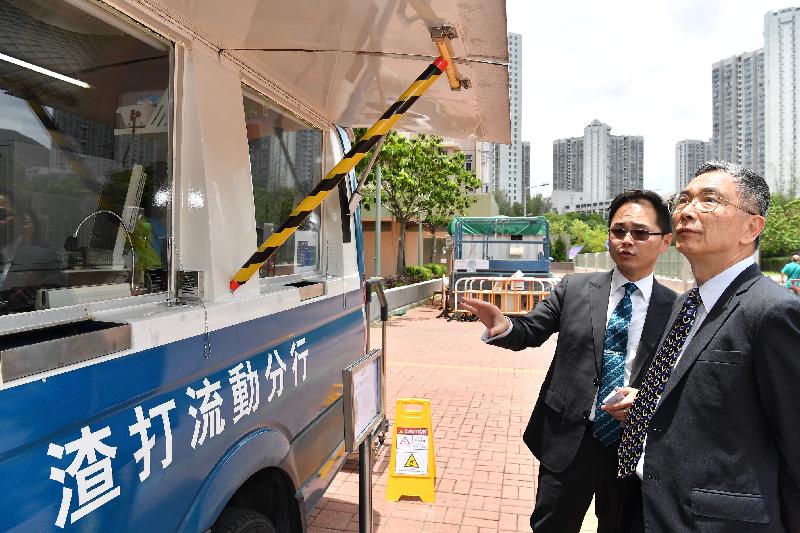Athlete selection for 7th Hong Kong Games to begin in July (with photos)
The 7th Hong Kong Games (HKG), including an inter-district sports competition and a series of community participation programmes, will be held in 2018 and 2019. The inter-district sports competition will be held from April 28 to June 2 next year, and the 18 District Councils (DCs) are set to begin the open selection of athletes from next month until January 2019. To tie in with the HKG's slogan of "Our City, Our Games", members of the public are encouraged to participate and represent their districts to compete in the Games.
The Chairman of the 7th HKG Organising Committee, Mr Yip Wing-shing, announced details of the HKG in a launching event held at Kowloon Park Sports Centre today (June 19). The Organising Committee's Executive Adviser, Mr William Tong; its Vice Chairman, Dr Patrick Yung; and the Assistant Director (Leisure Services) of the Leisure and Cultural Services Department (LCSD), Ms Rebecca Lou, also attended and officiated at the launching ceremony.
Noting that the HKG is a biennial major multi-sport event with the 18 DCs as participating units, Mr Yip said that the event aims at encouraging the public to proactively participate in sports events, as well as promoting the "Sport for All" culture. In addition, the HKG can also enhance communication among districts and strengthen the public's sense of belonging to their districts and community cohesion.
The 7th HKG will continue to hold eight sports competitions, namely athletics, badminton, basketball, futsal, swimming, table tennis, tennis and volleyball. Apart from the eight sports, Mr Yip announced that rugby sevens will be included as a new demonstration sport in the 7th HKG and sport-related fun games, namely Fun for All@Hong Kong Games, will be arranged for the audience to enjoy while cheering for the district athletes during the final competitions.
Two new events will also be held during the 7th HKG to boost city-wide participation. Through taking part in fitness tests of the Sports Legacy – Exercise to Get Super Fit programme jointly organised with the Sports Federation & Olympic Committee of Hong Kong, China (SF&OC), members of the public will be able to identify their potential in sports and keep practising afterwards. The popular Vitality Run will continue to be organised, and primary and secondary schools will also be invited to arrange a Hong Kong Games 7-minute School Vitality Run at their athletic meets for students, teachers and parents to enjoy running under the HKG theme song, so as to extend the excitement to schools.
Other major community participation activities of the 7th HKG will include Elite Athletes' Demonstration and Exchange Programmes as well as a Sports Seminar that will be held between July and November this year. The well-received Vitality Run will be held in March 2019 with a larger quota for public participation. The 18 Districts' Pledging cum Cheering Team Competition, a photo contest and voting and guessing activities will also be held.
Eight Sports Ambassadors for the 7th HKG have been appointed by the Organising Committee to assist in promoting the Games. They are Cecilia Yeung (athletics), Yuen Sin-ying (badminton), Leung Shiu-wah (basketball), Liu Yik-shing (futsal), Chan Kin-lok (swimming), Doo Hoi-kem (table tennis), Cody Wong (tennis) and Helen Ip (volleyball). A new TV Announcement in the Public Interest with the participation of Yeung, who took part in the 3rd HKG, and elite badminton athlete Lee Cheuk-yiu has been produced to appeal to the public for their active participation in the athlete selection. A variety of publicity measures will be launched to promote the HKG, with enhanced publicity through online and social media platforms.
The 18 DCs will start the selection of athletes shortly. Each participant can only enrol in the athlete selection of one district and compete in the HKG representing the district he or she lives in. An identity card and proof of place of residence must therefore be presented during enrolment. Pre-event training will be provided to selected athletes with a view to enhancing their skills and co-operation among team members.
There will be Champion, First Runner-up and Second Runner-up prizes awarded to athletes or teams in each individual competition, as well as Overall Champion, First Runner-up, Second Runner-up and District with Impressive Progress prizes for winning districts in each of the eight sports competitions. The three districts accumulating the highest total scores from the eight sports competitions will be awarded the Overall Champion, Overall First Runner-up and Overall Second Runner-up prizes of the 7th HKG.
In addition, the 7th HKG will continue to present prizes including District with the Most Gold Medals, District with the Greatest Participation, District with the Best Progress, District with the Best Sportsmanship, District with the Strongest Cheering Squad, Online Voting for My Favourite Sporty District and Paper Voting for My Favourite Sporty District.
The 7th HKG is organised by the Sports Commission and co-ordinated by the Community Sports Committee, with the 18 DCs, the LCSD, the SF&OC and relevant National Sports Associations as co-organisers.
Details about HKG are available at the 7th HKG dedicated website (www.hongkonggames.hk). For enquiries, please call 2601 7671.






